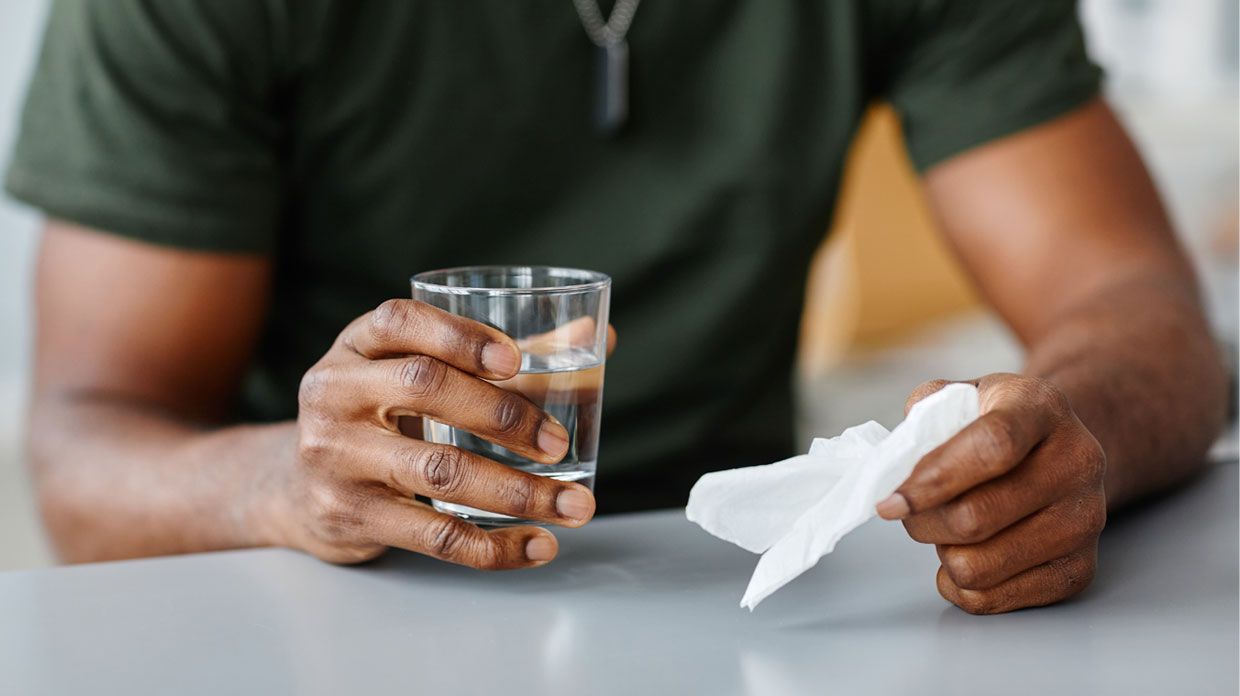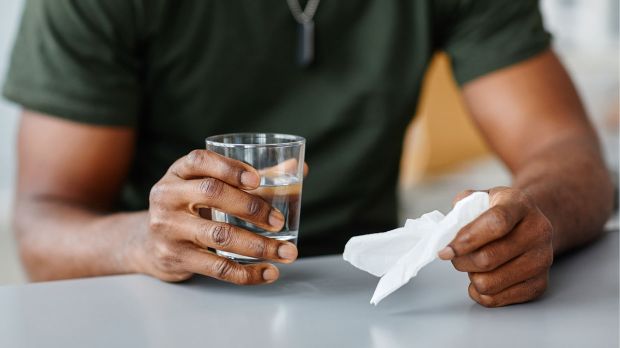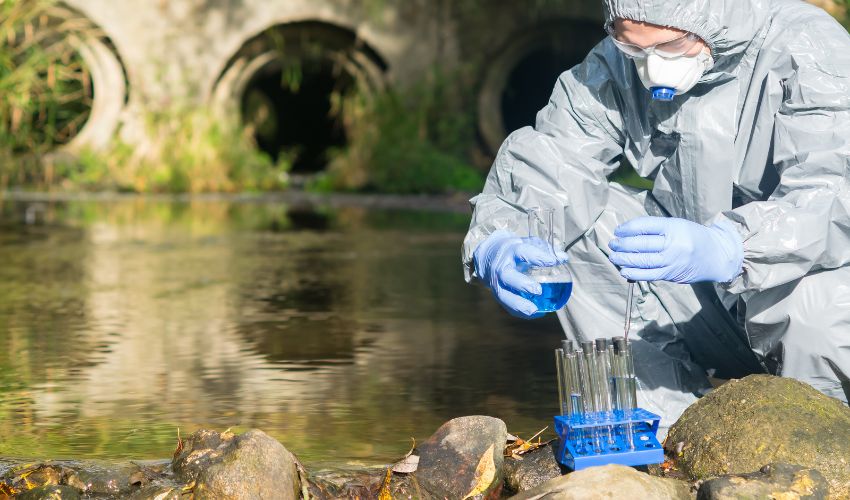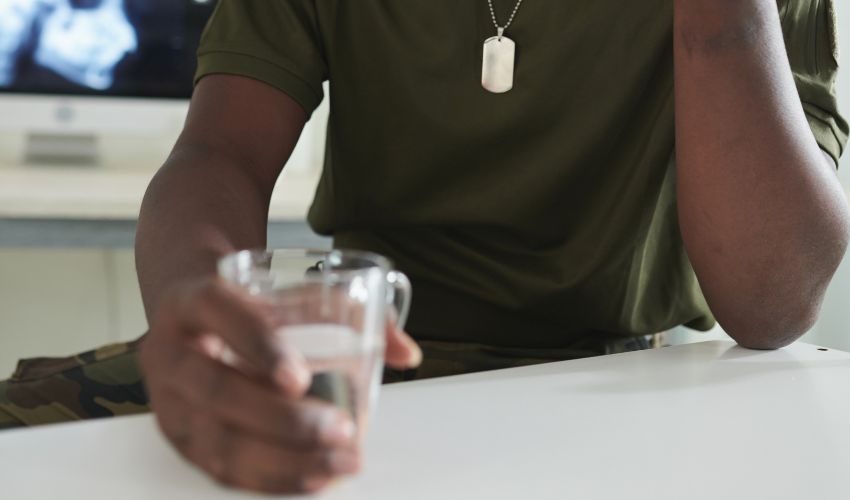


Camp Lejeune Claims Lawyer Serving Virginia
It is estimated over one million people, both military and civilians, have been affected by the toxic water discovered at Camp Lejeune. The idea of so many people suffering this type of exposure is unthinkable, but tragically, it happened.
Drinking the contaminated water from Camp Lejeune may have caused serious health issues for some people suffering exposure. For years, victims had no recourse to do anything about it. However, that has recently changed with the passing of the Honoring Our PACT Act in 2022.
If you meet the criteria outlined by this new law, you can now file a lawsuit to try and reclaim some compensation for your hardship and anguish. Let the knowledgeable and experienced attorneys at Montagna Law help you see this process through. Call our law firm at 757-622-8100 for a free consultation.
What Happened at Camp Lejeune?
Unbeknownst to anyone living or working at the Marine Corps base in Jacksonville, North Carolina, the water supply was contaminated for decades. The presence of toxic water began in 1953 but was not known until 1982 when the Marine Corps discovered volatile organic compounds (VOCs) in the supply. The origins of the contamination came from two sources, the Tarawa Terrace Water Treatment Plan and the Hadnot Point Water Treatment Plan.
Tarawa Terrace Water Treatment Plant
Tarawa Terrace Water Treatment Plant’s contamination was due to the waste disposal practices of dry cleaning solvents originating from ABC One-Hour Cleaners, a local, off-base dry cleaner. This business was in operation from 1964 to 2005 and used “improper disposal practices,” resulting in both soil and groundwater contamination, according to the U.S. Environmental Protection Agency (EPA). The biggest contaminant stemming from this location was PCE.
While this dry cleaner operated, VOCs were seeping into the ground and contaminating Camp Lejeune wells. The wells containing the highest level of contamination were shut down in 1985, but by that point, people had suffered exposure for years, dealing with serious health problems and not knowing the reasons behind their sicknesses.
ABC One-Hour Cleaners was sold in 2005, renamed, and permanently shut down in 2011. The buildings were demolished in 2017.
Hadnot Point Water Treatment Plant
Several factors contribute to the water contamination occurring at the Hadnot Point Water Treatment Plant. These include leaky storage tanks, industrial spills, and being in proximity to waste disposal sites. When examining the water, several toxic chemicals were found in the water source, primarily TCE (trichloroethylene). Long-term exposure to TCE can have a severe impact on a person’s health, creating adverse health conditions or, sadly, even wrongful death.
Which Toxic Chemicals Were Found in the Water at Camp Lejeune?
The opening of Camp Lejeune occurred in 1942, and even today, it is a busy east coast military base. Over the decades, many people have moved in and out of the installation to obtain training, perform jobs, or prepare for deployment. Anyone who spent more than 30 days (does not need to have been consecutive) at Camp Lejeune between August 1, 1953, and December 31, 1987, is considered to have suffered exposure to one or more of the following major drinking water contaminants.
Vinyl Chloride
Vinyl Chloride is an extremely flammable substance utilized in commercial and industrial settings to create plastic products, such as pipes, wires, cable coatings, and packaging materials. People can suffer exposure from this VOC through inhalation (the primary form of exposure), skin contact, eye contact, and ingestion.
TCE
TCE, its chemical name perchloroethylene or trichloroethylene, is another type of VOC that does not occur naturally in the environment. As a completely artificial substance, it is derived through chemical synthesis. Dry cleaners often use TCE as a spot remover; the U.S. military uses it as a degreaser for its equipment, both of which occurred at or near Camp Lejeune.
In the industrial or work setting, conventional thinking dictates people should wear protective gear when working with PCE. Sadly, those individuals drinking contaminated water were unaware of their exposure to TCE and could not take proper precautions.
PCE
PCE, its chemical name tetrachloroethylene, has many purposes but is primarily used in dry cleaning, metal cleaning, and textile processing, to name a few. It can be released into the air, water, and soil in areas it is produced or utilized. Exposure to PCE can affect a person’s nervous system, memory, ability to process information, and visual capacity.
Benzene
Benzine is a highly flammable chemical primarily used to make other chemical substances, along with a few industrial and consumer products. Overexposure to this chemical can be toxic. Exposure mostly occurs through inhalation and ingestion.
When the concentrations of chemicals in water were evaluated, in some cases, more than 300x higher than deemed acceptable levels of VOCs were found. Service members, civilian workers living or working at Camp Lejeune, and their family members were routinely exposed to these toxic chemicals while doing everyday things such as drinking water, cooking, laundry, or taking a shower. As a result, many suffer from serious medical conditions, creating adverse health effects.

What is the Camp Lejeune Justice Act?
President Biden signed the Honoring Our Pact Act on August 10, 2022. This law provides more than five million service members with healthcare and benefits if they suffered exposure to dangerous conditions, including radiation, Agent Orange, burn pit fumes, and other types of toxins during their job assignments.
Honoring Our Pact Act is Inclusive of Camp Lejeune Victims
The Honoring Our Pact Act of 2022 also incorporates the Camp Lejeune Justice Act, which is an attempt to correct the grievous wrongs for victims of water contamination. Previously, military members were not permitted to file personal injury lawsuits due to the Feres Doctrine. However, with the passage of this new law, anyone meeting the criteria who suffered from Camp Lejeune water contamination, including victims who now live in the Hampton Roads area, can now pursue justice and compensation for their suffering.
Who is Eligible to Pursue Camp Lejeune Compensation?
Active duty men and women who served in the Army, Navy, Marines, Air Force, and Coast Guard at Camp Lejeune are eligible to receive benefits and pursue compensation. Other individuals who may qualify if they meet the criteria outlined in the law include family members living on base, on-base civilian government workers, on-base government contractors, veterans, reservists, National Guard members, and babies exposed in utero.
Essentially, any person who spent 30 cumulative days or more at Camp Lejeune in the designated timeframe is eligible to pursue compensation. It is vital to speak to a water contamination attorney as soon as possible to see if you qualify and begin filing a claim immediately. Time is limited. You only have until August 10, 2024.
Presumptive Illnesses Caused by Toxic Water at Camp Lejeune
The Agency for Toxic Substance and Disease Registry (ATSDR) is actively analyzing all the data connected to the Camp Lejeune water contamination. To date, it has found several diseases and illnesses linked to the chemicals found in the toxic water. The following are the most common, but it is entirely possible more will be added to the list as the analyzation is ongoing.
Bladder Cancer
The PCE chemical is linked to bladder cancer. While this type of cancer is treatable, it does have a high probability of recurring. Camp Lejeune victims who receive this diagnosis need ongoing monitoring and typically require repeat treatments. Symptoms of bladder cancer include pain or burning sensations during urination, blood/blood clots in the urine, frequent or feelings of frequently needing to urinate, which may or may not produce urine output, and lower back pain.
Breast Cancer
Breast cancer most often occurs in women, but men can also be diagnosed with this serious type of cancer. Symptoms of breast cancer include:
- Lumps or thickening in breast tissues
- Changes in the size, shape, or appearance of one or both breasts
- Newly inverted nipple(s)
- Peeling, flaking, dimpling, or other visible changes in the areola or breast skin
- Redness or pitting of skin
Breast cancer is associated with the water contamination and victims who suffer or receive a diagnosis of breast cancer meet the criteria for a presumed illness caused by the VOCs.
Liver Cancer
Exposure to TCE can cause liver cancer. Victims with liver cancer often experience nausea, vomiting, loss of appetite, weakness, pain in the upper part of the stomach, abdominal swelling, jaundice, weakness, and passing white chalky stools.
Esophageal Cancer
Esophageal cancer is increasingly linked to exposure to toxic water. It is a type of cancer that occurs in the area between a person’s throat and abdomen. When the tissue in the esophagus turns cancerous, victims may feel pain and pressure in the chest, have difficulty swallowing, experience bouts of coughing, have unexplained weight loss, heartburn, indigestion, and unexplained weight loss.
Kidney Cancer
TCE is linked to kidney cancer and is another presumptive illness associated with Camp Lejeune exposure to VOCs. A victim may experience fatigue, persistent back pain, loss of appetite, blood in the urine, and unexplained weight loss.
Leukemia
Leukemia is a type of cancer afflicting a person’s blood-forming tissues, lymphatic system, and bone marrow and is another presumptive illness connected to Camp Lejeune. Symptoms include fever and chills, consistent fatigue, easy bleeding and bruising, petechiae, frequent nosebleeds, weakness, frequent infections, swollen lymph nodes, heavy sweating, bone pain and tenderness, and unexplained weight loss. Victims may experience a combination of any of these symptoms.
Lung Cancer
Lung cancer is one of the presumptive illnesses associated with the drinking water at the North Carolina military base. Symptoms of lung cancer include persistent cough, pain in the chest, shortness of breath, bone pain, coughing up of blood, hoarseness, and unexplained weight loss.
Multiple Myeloma
Multiple myeloma is a type of cancer that forms in a victim’s plasma cells, adversely impacting their white blood cells and causing problems in their ability to fight infections. Studies find PCE as a contributor to this type of cancer. Multiple myeloma reproduces quickly, harming healthy cells. Multiple myeloma symptoms include frequent infections, confusion (fogginess), fatigue, nausea, loss of appetite, excessive thirst, bone pain, weakness and numbness in the legs, and unexplained weight loss.
Neurobehavioral Effects
The VOCs present in Camp Lejeune water can lead to neurobehavioral effects in people suffering exposure. This condition is a term that classifies ailments directly impacting a person’s nervous system and their behavior. Indications a victim is experiencing the neurobehavioral effects of toxic exposure include difficulty concentrating, poor memory, dementia, fatigue, insomnia, motor skill difficulties, and PTSD.
Parkinson’s Disease
Victims who drank water containing VOCs at Camp Lejeune are commonly given a diagnosis of Parkinson’s Disease. Parkinson’s Disease is a progressive nerve disorder that falls under the category of neurobehavioral effects.
Symptoms start off mild, but then steadily progress over time and can include tremors, slower movements, posture difficulties, and shuffling of the feet, along with balance and coordination problems. Over time, the ability to perform automatic movements also tends to deteriorate.
Non-Hodgkin’s Lymphoma
This type of cancer directly attacks a person’s immune system and can spread quickly throughout the body’s lymphatic system and other areas including bone marrow, adenoids, spleen, tonsils, and thymus. Symptoms of non-Hodgkin’s lymphoma include stomach pain, swelling in the stomach, coughing, chest pain, trouble breathing, night sweats, ongoing fatigue, fever, swollen lymph nodes, and unexplained weight loss.
Renal Toxicity
The kidney filters toxins and chemicals entering the blood. When the kidneys can not do their job, a victim can suffer from unsafe levels of toxins which adversely affect the body if not treated quickly. Signs of renal toxicity include swelling in extremities (feet, ankles, legs), fluid retention, irregular heartbeat, pain and pressure in the chest, shortness of breath, confusion, seizures, or falling into a coma.
Aplastic Anemia
Aplastic anemia is a degenerative condition that falls under the myelodysplastic syndromes (MDS) umbrella. Victims with a diagnosis of this disorder frequently feel fatigued, look pale, experience shortness of breath, and experience easy bruising and bleeding.
Other conditions linked to the VOCs found in the Camp Lejeune water supply include scleroderma, hepatic steatosis, infertility, birth defects, and many other types of cancer and myelodysplastic syndromes. It is important to note the ATSDR study is ongoing; there is an expectation of a five-year time period to complete it. Other health conditions and cancer types may also be linked to the Camp Lejeune water supply contamination.

How Do I Know If I Qualify to File a Camp Lejeune Lawsuit?
To qualify to file a Camp Lejeune lawsuit in Hampton Roads, you must meet certain requirements and have the documentation to support your claims, such as military service records, medical records, proof of residency, and testimony. Important criteria also include the following:
- Spending more than 30 cumulative days at Camp Lejeune
- Living or working on base between August 1, 1953, and December 31, 1987
- Becoming ill with one of the listed illnesses
Family members who also fit the above-listed criteria also qualify to file a lawsuit and receive compensation to help pay for medical expenses and other costs associated with sickness and medical care.
What is the Statute of Limitations on Filing a Camp Lejeune Claim in Hampton Roads?
Under the Camp Lejeune Justice Act, you have two years from August 10, 2022 (the day President Biden signed the law) to file a claim. This means you have until August 10, 2024, to meet this deadline. Anyone affected by the contamination must file their claim through the United States District Court for the Eastern District of North Carolina.
Proof of harm through exposure to contaminated water is required. If you or a loved one fell ill due to Camp Lejeune’s toxic water exposure, gathering the documentation needed to prove your qualifying claim will take time. It is important to call an experienced personal injury lawyer as soon as possible to get your claim started; the process is complex.
How Long Will a Camp Lejeune Lawsuit Take?
At this time, we cannot assess the length of time a lawsuit will take since the announcement of eligibility just occurred in mid-August. The Camp Lejeune water contamination situation is unprecedented, and there is no estimate to compare to except to liken it to other types of civil lawsuits that take roughly 16 to 26 months.
Unfortunately, there is also no baseline to help determine how much compensation victims can receive. All verdicts have yet to be reached as cases are still getting on the docket. With that said, how much victims may receive will vary. It is likely settlement amounts and jury awards will depend upon the amount of exposure and how it has affected you.
Generally, compensation will likely include reimbursement for past and current medical expenses, money to help pay future medical costs, compensation for lost income and loss of future income, and restitution for the loss of a loved one in the event of wrongful death.
How Will Montagna Law Help Your Virginia Camp Lejeune Claim?
Many of the people affected by the Camp Lejeune catastrophe currently live in the Hampton Roads area, being we have such a large military population in this area of Virginia. All of us at the Montagna Law law firm are horrified at the conditions victims currently living in our community have had to endure.
We are passionate about our clients and will provide sound legal advice while applying our strong legal knowledge to help our neighbors and friends obtain the compensation they deserve.
While the U.S. government has allowed victims recourse with the passing of the Camp Lejeune Justice Act, they have made the process extremely complicated. Our Camp Lejeune lawyers know what military records and medical evidence you will need to showcase so you and your loved ones can get compensation.
Sadly, the Department of Veterans Affairs (VA) is still denying victims the full compensation they deserve for their suffering from toxic water exposure. Some are receiving outright denials. Others are being deprived of compensation because they are missing records or have incomplete paperwork.
As your attorney, we can speak to the VA on your behalf about disability compensation, health care benefits, and anything else you need, even when it comes to filing a Camp Lejeune water contamination lawsuit. We can also help work through any red tape your encounter and prove your family’s eligibility.
Did Drinking Contaminated Water Make You Sick?
If you or a family member suffer an illness or become sick from VOCs in the water you drank or used daily, the Hampton Roads water contamination lawyers at Montagna Law can help. We place a high value on the transparency we hold with our clients, and we commit ourselves to help our clients get the compensation they need.
Money will not replace your losses, but it can help to pay your exorbitant medical bills, cover lost wages, and make your life easier. You are not alone in your suffering over contaminated drinking water. We are here and want to help you through this difficult process.
To obtain a free case evaluation about your time at the Camp Lejeune Marine Corps base, contact our legal team at 757-622-8100 or through our convenient online contact form. Our law office services the entire Hampton Roads area, including Virginia Beach, Norfolk, Chesapeake, Portsmouth, and Suffolk.
-
If you’re looking for someone who’s professional, attentive, serious, caring, and negotiable than Mr. Anthony Montagna is who you need. He understood his assignment and delivered well especially being with what I was looking at in my case. I want …– Tiara S.
-
I don’t know how he does it, but this man is a monster in the courtroom. I’ll admit I had fears of the outcome of my case, but when I was with Mr. Montagna in front of a judge. My confidence started to raise. Extremely professional and how he hand…– BD P.
-
Honestly , Mr. Montagna treats like you are his family the way he cares, he takes care of his people , I was doing triple digit speed on a 60 and lord I thought it was over for me in that courtroom , he’s a genius because I literally got away with…– Justin
-
I have been a client of Montagna Law since 2014. Because the customer service is exceptional, I have established a rapport with everyone in the office. As a customer for 8 years, it is noted that this firm goes above and beyond for the clients.– Eric E.
-
Montagna Law are wonderful attorneys. I was diagnosed with stage 4 lung cancer and they assisted me from day one when I contacted them. I highly recommend their services! Thanks guy’s and gal’s for your services!– Kevin B
